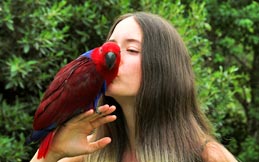
Just like with any kind of pet there are potential health risks associated with owning a parrot. These risks are more serious than getting pooped on or getting bit. The top two health risks for humans who have parrots for a pet or work with parrots are zoonosis and allergies.
Zoonosis is a disease that has been transmitted from an animal, in this case a parrot, to a human being. Zoonosis is not something that’s unique for pet parrots. Almost all kinds of pet can give its owner zoonosis. Some of the common diseases contracted from pets are rabies, salmonella poisoning, worms, and various bacterial infection. From parrots and other birds the most serious disease that people can catch is called the Parrot Fever. Parrot fever or psittacosis is caused by a bacterium called Chlamydia psittici. The disease leads to flu-like symptoms including nausea, fever, vomiting, headaches, chills, and malaise. Parrot fever is especially dangerous for pregnant women, immuno-compromised people, the elderly, and those with respiratory problems. The good news is that parrot fever can be treated using antibiotics (tetracycline or doxycycline) nowadays and so is not as dangerous as it once was. Without the treatment however fatality rate in humans is 15-20%. So if you are a parrot owner and experience some of the symptoms do not just assume that you have the flu. Go to your doctor and inform him that you own a parrot. Also whenever you purchase a new bird make sure to take it to a vet, preferably an avian specialist, to have it quarantined and observed first. This is important to ensure that your other pets and members of the household will not contract the disease if your new parrot has it. Note that it is not only birds and people that can contract the disease but other animals as well.
Allergies are a more common problem than parrot fever. Some pet owners develop allergies not only to the parrots but also to the bird feed. If you find that you are allergic to your pet’s food then simply shift your pet to another kind of pet food. However, if you find that you are allergic to feathers or simply to you bird itself then you have to decide whether your allergies will permit you keep your pet or are serious enough for you to give up your pet. Some dedicated pet owners find that they can deal with the problems brought about by their allergies. To help lessen the allergens in your house or yard or wherever you keep your parrot, make sure that the parrot cage is regularly cleaned with a wet mop and that the surrounding area or the entire room it is kept in is regularly vacuumed using a cleaner with HEPA filter. You can also purchase an air cleaning device to improve air quality. Some people however develop what is called the Bird Fancier’s Lung. It is a serious condition wherein allergens from your bird trigger an unwanted immune response in your body. If you have this you definitely cannot keep a parrot as a pet.